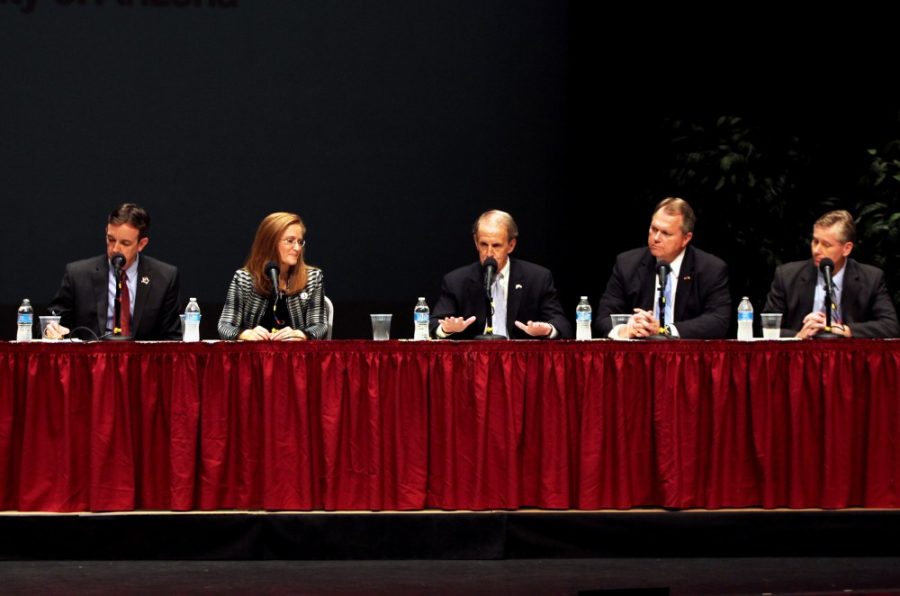Border security and education remained top issues among the Republican candidates for Arizona governor in a forum Wednesday night at Pima Community College – West Campus.
The gubernatorial forum, hosted by the League of Women Voters of Greater Tucson and Arizona Public Media, was moderated by Lorraine Rivera, host of Arizona Week, and featured five of the six Republican candidates – Christine Jones, Scott Smith, Ken Bennett, Frank Riggs and Andrew Thomas. Doug Ducey, who sits atop the polls for the Republican nomination, declined to participate.
The candidates addressed border security as one of the largest issues facing the state of Arizona. Thomas, former Maricopa County attorney, said securing the border is a top priority.
“If we don’t secure our border … this state will go broke,” Thomas said.
Thomas touted his work with Maricopa County Sheriff Joe Arpaio in going after undocumented immigrants in the county. He also called illegal immigration one of the main causes for Arizona’s higher unemployment rate.
Jones, former executive vice president and general counsel for GoDaddy, spoke about her plan for securing the Arizona-Mexico border, which was endorsed by Pinal County Sheriff Paul Babeu. The plan calls for 1,200 National Guardsmen to help secure the Tucson sector of the border and finishing the border fence. However, Jones said that immigration policy is set by the federal government.
“I also think it’s important for us to acknowledge as a state that the federal government is specifically responsible for immigration policy,” Jones said.
Bennett, Arizona secretary of state, questioned Jones on the costs of her plan and why she wants to “send the bill to Washington.” Jones said the cost for her plan is estimated to be $270 million.
Jones said the federal government should pay for the plan because it is within its domain of responsibility.
Smith, mayor of Mesa, said securing the border should also mean increasing legal crossings at the border.
Public education was also a major topic at the forum. Riggs, a former representative from California, said if he were to become governor, he would use his power to repeal Arizona’s participation in Common Core State Standards Initiative.
“I want to restore local control and decision-making in K-12 education,” Riggs said. “I want Arizonans to take responsibility for how we educate our kids.”
Bennett and Jones both said more money needs to be going into the classroom.
The candidates responded to questions, which ranged from the Affordable Care Act to unemployment in Arizona, that were submitted by voters for the debate. They also were given the opportunity to pose questions for each other.
Smith called out Ducey, state treasurer, for not participating in the forum and said Ducey was dodging questions.
Higher education
Some of the candidates also addressed their plans for dealing with higher education in the state.
Jones said Arizona needs to focus on a more integrated approach to K-12 and higher education. Such an approach would help make higher education more successful and more affordable, she said.
Jones also stressed that not everybody needs to go to college and many are still needed to do mechanical jobs and others that don’t require a college education.
“We need to take that seriously so that [students] don’t funnel into education, spend a lot of money and incur a lot of debt for things they are not going to be using in their future employment,” she said.
Smith said he wants to make the UA and Arizona State University internationally renowned universities through finding their areas of expertise. He said he will be meeting with UA President Ann Weaver Hart to discuss the UA focusing on Mexico and Latin America.
Smith also said that higher education is becoming more out of reach for the average person due to rising tuition costs. The Arizona Constitution says that education must be as free as possible, he said, and the state is contributing less to the state universities.
“That’s got to change,” he said. “We’ve got to make higher education more affordable. We’ve got to elevate and invest in our universities so that they can become the economic engines and drivers they need to be.”
Bennett said he sees higher education as an investment, even during tough economic times. During his time as president of the Arizona Senate about ten years ago, the legislature funded $440 million of university infrastructure research projects, he said.
“I have a proven record, and I am the only one who served in the Arizona state legislature, of prioritizing higher education and making it a critical part of our budget and the investments we make for our future,” Bennett said.
Upcoming elections
The primary election is set to take place on Aug. 26 with early voting already underway. Ducey and Jones lead the field, according to a mid-July survey of likely voters from Harper Polling. Ducey has 23 percent to Jones’ 21 percent, which falls within the margin of error of about 3.3 percent. Jones has been making gains on Ducey in the polls in recent weeks.
Smith, Bennett, Thomas and Riggs polled at 13 percent, 12 percent, 7 percent and 1 percent, respectively, and another 22 percent indicated they were still undecided.
The winner of the primary election will face the likely Democratic nominee, Fred DuVal, former chairman of the Arizona Board of Regents, in the general election in November.
The League of Women Voters of Greater Tucson and AZPM will host five more forums this election season for candidates for statewide office.









